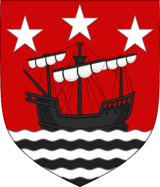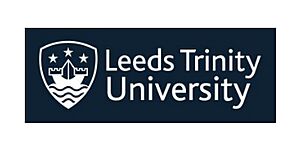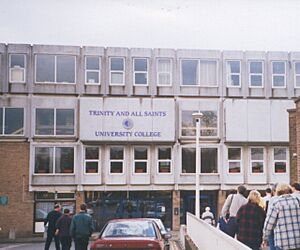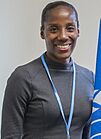Leeds Trinity University facts for kids

|
|
|
Former names
|
All Saints College Trinity College Leeds Trinity & All Saints |
|---|---|
| Type | Public |
| Established | 1966 1980 – merger 2012 – university status |
|
Religious affiliation
|
Roman Catholic |
|
Academic affiliations
|
ACCU Cathedrals Group MillionPlus |
| Chancellor | Deborah McAndrew |
| Vice-Chancellor | Charles Egbu |
| Students | (2015/16) |
| Undergraduates | (2015/16) |
| Postgraduates | (2015/16) |
| Location |
Horsforth, Leeds
,
,
England
53°50′55″N 1°38′53″W / 53.8486°N 1.6480°W |
| Campus | Suburban |
 |
|
Leeds Trinity University is a public university located in Horsforth, Leeds, West Yorkshire, England. It started as a place to train teachers for Catholic schools. Over time, it grew and now offers many different courses. Students can study subjects like history, English, and social sciences.
The university was once called Leeds Trinity & All Saints. In 2009, it became a university college, meaning it could give out its own degrees. By December 2012, it officially became a full university. Leeds Trinity is part of groups like the Cathedrals Group and the Association of Catholic Colleges and Universities.
Contents
History of Leeds Trinity University
Leeds Trinity first opened in 1966. It began as two separate Catholic colleges in Yorkshire for training teachers. Trinity College was for women, and All Saints College was for men. Back then, Britain needed many new teachers because of a "baby boom" after World War II.
Trinity College had three living areas for female students. These were named Shrewsbury, Whitby, and Norwich. A convent for the Sisters of the Cross and Passion was also nearby. All Saints College was built on the south side of the campus. It had four living areas for male students. These were named Fountains, Rievaulx, St Albans, and Ripon.
Each college had its own leader. Augusta Maria led Trinity College. Andrew Kean was the first leader of All Saints College.
In 1980, the two colleges joined together. They became Trinity and All Saints College. Dr. Mary Hallaway became the first leader of the new combined college.
In 1970, Andrew Kean suggested that the colleges should offer more types of courses. This would help them survive, even though their main goal was still to train Catholic teachers. So, new study areas were added. These included Humanities, Modern Languages, and Sciences. This allowed students to study another subject along with their teacher training. A special course for future secondary school teachers was also started.
After the colleges merged in 1980, they had to prove that all their courses were useful. Some courses were changed, and efforts were made to get more students. This was done while keeping the college's Catholic identity. However, some departments like Music, Science, and Drama eventually had to close. Despite this, the number of students slowly grew during the 1980s.
In the 1990s, Trinity & All Saints faced new challenges. More universities were opening, like Lincoln and Huddersfield. These newer universities had become full universities in 1992. Also, the government was cutting funding for smaller university colleges. Even so, the college was able to add more courses, especially in Communications and Media. By 1998, nearly 2,000 undergraduate students and 250 postgraduate students attended the college.
In 1991, Leeds Trinity became a college of the University of Leeds. They made a formal agreement in 2001. In 2009, Leeds Trinity gained the power to award its own degrees. It then became a university college. In 2011, students at the new university college held a long protest. They were against the national increase in university fees.
In November 2012, the government changed the rules for becoming a university. The number of students needed was lowered. Because of this, Leeds Trinity was recommended to become a university. It officially became a university in December 2012. In 2016, Leeds Trinity celebrated its 50th anniversary. They held a special Mass and invited famous speakers. One speaker was Nobel Peace Prize winner Mairead Maguire.
Campus and Facilities
Leeds Trinity is a campus university. It is located in Horsforth, near the village of Rawdon. There is also another campus in Leeds city centre. The main campus is about 6 miles (10 km) from the city centre. Horsforth railway station is a 15-minute walk away. Trains from there take 15 minutes to reach Leeds city centre. The city centre campus is very close to Leeds railway station.
From 2009 to 2010, the main campus was greatly improved. A new student living building, All Saints Court, was built. It has 198 bedrooms.
Student Accommodation
Leeds Trinity has eight student living halls on campus. All Saints Court is one of these. It cost £6 million to build. It opened in September 2010 and has 198 bedrooms. These rooms have their own bathrooms and cooking facilities.
University Library
The university library is in the Andrew Kean Learning Centre. Students can use over 500,000 online books. There are also 115,000 printed books. A large section helps students who are training to be teachers. The library is open 24 hours a day.
Science Laboratories
The university has a fully equipped sports science lab. There is also a separate lab for nutrition and food preparation. These labs help students with fitness testing and studying food.
Psychology students have several labs. These include labs for studying the brain, human assessment, and how people think. There are also labs for child development and forensic psychology.
Primary Education Classrooms
The primary education classrooms have many resources. Students can practice with equipment used in schools. This includes interactive whiteboards and early years resources. There are also computer rooms and art supplies.
Sports Facilities
Leeds Trinity's sports centre was updated in 2007. Inside, it has a sports hall and a fitness room with weights. There are also two treatment rooms and a studio for movement classes. It has a gymnasium and two squash courts.
Outside, Leeds Trinity has 3 full-size rugby/football pitches. There are also 6 tennis courts and 2 multi-use hard courts. A running track is available too.
In 2012, Leeds Trinity opened a new 3G All Weather Pitch. This pitch is made of the latest type of artificial grass. It is approved for both football and hockey.
University Leadership
Leeds Trinity is an independent Catholic university. Before 2009, the University of Leeds approved its degrees.
The Board of Governors is in charge of Leeds Trinity University. The main leader of the Board is the Rt Revd. Marcus Stock. He is the Roman Catholic Bishop of Leeds.
The Board lets Professor Charles Egbu, the Vice-Chancellor, manage the university daily. He gets advice from his team. This team includes Professor Malcolm Todd, Professor Catherine O'Connor, Phill Dixon, and David Butcher.
The university's Chancellor is Deborah McAndrew. She is an actor and writer. She started this role on June 15, 2018.
Academic Information
Leeds Trinity had 3,715 students in 2015/16. Most of them study full-time. About 35% of students are male, and 65% are female.
Every degree program includes a professional work placement. This means students get real-world experience. Leeds Trinity works with local businesses, industries, and schools to arrange these placements.
Students who might not have the right qualifications for university can take foundation year programs. These are offered in subjects like Sport, Social Science, Law, and Computing.
University Rankings
| National rankings | |
|---|---|
| Complete (2021) | 116 |
| Guardian (2021) | 105 |
| Times / Sunday Times (2021) | 112 |
| Global rankings | |
| British Government assessment | |
| Teaching Excellence Framework | Silver |
In university rankings from September 2024, Leeds Trinity was outside the top 100 in some guides. For example, it was 108th out of 131 in The Complete University Guide. It ranked a bit higher in The Guardian league table, at 85th out of 121.
The university did best in The Times/The Sunday Times table. It was tied for 67th place out of 129 universities. Leeds Trinity focuses a lot on teaching. Because of this, it does not do as much research. This can lead to a lower position in some major ranking tables.
Leeds Trinity has always done well in other areas, like teaching quality. In The Times/The Sunday Times University league table for 2018, it was in the top 10 for both teaching quality and student experience. It also ranked 39th for the number of students who earned top grades. In 2016, 81% of students were happy with their overall experience. Some courses, like Business and Management, had 100% student satisfaction.
Research and Partnerships
Leeds Trinity is home to several research centers and projects.
Leeds Centre for Victorian Studies
This center started in 1994. It is one of the oldest and most active places in Britain for studying the Victorian era. It helps publish a journal and papers. It also offers a Master's degree in Victorian Studies. The center holds many seminars and conferences.
Schools History Project
The Schools History Project helps develop history education for students aged 13–16. It holds a yearly conference and offers training for teachers. It also publishes a regular newsletter and works with a publishing company to create learning materials.
Leeds Trinity Business Network
The Leeds Trinity Business Network helps local businesses connect. It allows them to share ideas and work together. This network started in 2011 and now has over 80 members.
Journalism Partnerships
Leeds Trinity has won an award from BBC North for its "inspirational" journalism teaching. Students training in journalism at Leeds Trinity have won the Partnership's Journalism award multiple times. Leeds Trinity works closely with the BBC. This gives students many chances for work placements and workshops. These opportunities are at MediaCity in Salford and BBC Yorkshire in Leeds. Students get to work in a real newsroom setting. This helps them learn to meet deadlines. Leeds Trinity also works with commercial news companies. Many news editors and reporters from major news channels trained at Leeds Trinity.
Famous Alumni
-
Steven Linares, a politician from Gibraltar
-
Jason McCartney, a Conservative Party MP
-
Mary Davis, CEO of Special Olympics
-
Fiona May, Olympic long jump medalist
Politics and Government
- Nicola Chapman, Baroness Chapman – A British peer and activist for disability rights.
- Mary Davis – An Irish candidate for president.
- Kris Hopkins – A Conservative Party MP.
- Steven Linares – A Liberal Party of Gibraltar MP and government minister.
- Jason McCartney – A Conservative Party MP.
- Paul McGrath – An Irish politician from the Fine Gael party.
Arts and Media
- Xana Antunes – A business journalist and former editor of the New York Post.
- Kate Bottley – A Church of England priest and TV personality.
- Stephanie Busari – A journalist for CNN.
- Kate Fox – A writer and comedian.
- Nick Hodgson – An English musician, formerly the drummer for Kaiser Chiefs.
- Lis Howell – A journalist, author, and Director of Broadcasting at City, University of London.
- Julian Jarrold – A TV and Film Director, known for Kinky Boots and Becoming Jane.
- Edward Jarvis – An author and historian of religion.
- Rebecca John – A TV presenter.
- Shaun Keaveny – A radio presenter for BBC Radio 6 Music.
- Dorothy Koomson – A novelist.
- Rachel Mackley – A TV weather presenter for South East Today.
- Maureen Meikle – A historian and former Head of Humanities.
- Mark Morris – An author.
- Hughie O'Donoghue – A British painter.
- David Olusoga – A historian and broadcaster.
- Gervase Phinn – An author and broadcaster.
- Paula Pryke – A florist.
- Don Riddell – A sports journalist for CNN World Sport.
- Natalie Sawyer – A Sky Sports News presenter.
- Kimberley Walsh – A singer from the group Girls Aloud.
Sport
- Dayle Coleing – A goalkeeper for the Gibraltar national team.
- Fiona May – A British-born Italian athlete and Olympic medalist in long jump.
- Ian Thompson – A marathon runner and Commonwealth Games champion.
See Also
- Armorial of UK universities
- College of Education
- List of universities in the UK






